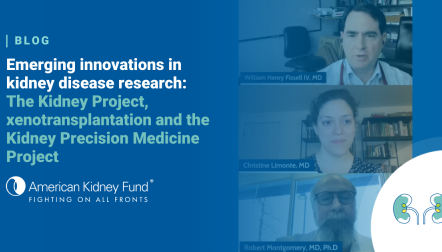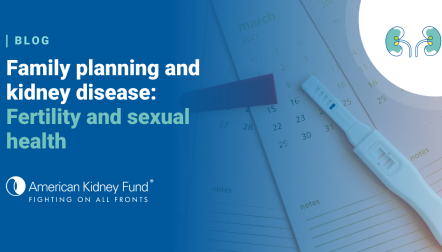
Blog post
Gender versus sex and the kidneys: How does gender identity impact kidney health?

If you have ever been to a doctor's appointment, you are familiar with the process of filling out the same questionnaire to collect your medical information over and over. Name, date of birth, sex — a tedious task for most, filling out these forms can be more challenging for transgender or gender diverse people. And it also may impact their health decisions, including their kidney health.
There is a difference between sex and gender. Sex is a biological variable related to sex organs and hormones a person is born with. Gender is based on societal expectations and definitions and includes gender identity, gender roles and gender expressions. Transgender individuals are people whose gender identity differs from the sex they were assigned at birth. For gender diverse people, their gender identity may not be male or female, as gender includes a spectrum of identities beyond the cisgender binary of male/female.
To help make their gender and sex better align, some transgender or gender diverse people may choose to pursue gender affirming hormone therapy (GAHT). GAHT involves changing the levels of sex hormones in a person's body. Transgender men (men who were assigned female at birth) or gender diverse persons may receive masculinizing therapy, which decreases their estrogen levels (a sex hormone) and increases their testosterone levels (a sex hormone). Transgender women (women who were assigned male at birth) or gender diverse persons may receive feminizing therapy, which does the opposite — decreasing or blocking testosterone and increasing estrogen.
The impact of gender identity and gender affirming treatments like GAHT on kidney health is not well known at the moment, as studies on health for the lesbian, gay, bisexual, transgender and queer (LGBTQ) community are generally lacking with even fewer focused specifically on kidney health. Fortunately, there are new efforts underway to correct this, including a research program in Canada exploring the intersection of the gender diverse populations and kidney health.
Dr. David Collister (who uses he/him pronouns) and Dr. Emily Christie (who uses she/her pronouns) are two members of the research team conducting this national study. In addition to being faculty members in the University of Alberta (Edmonton, Canada)'s Department of Medicine, Dr. Collister is a nephrologist (kidney doctor) and Dr. Christie is a transplant nephrologist. Dr. Collister's research focuses on the impact of GAHT on kidney function while Dr. Christie is looking at how GAHT impacts peri-operative decisions and post-transplant care for potential transplant recipients or donors.
GAHT and kidney function
"There are very few dedicated studies about the safety of gender affirming hormone therapy and gender confirmation surgery from a kidney perspective, which is why we're doing the work that we're doing," Dr. Collister said.
Through his patient-focused study, Dr. Collister aims to determine if there is any impact on the kidneys when someone decides to undergo GAHT. There are sex differences in kidney disease in the cisgender population that may be related to sex hormones or gender identity, so it is possible that the changes from GAHT may impact kidney function.
"We published on how [GAHT] changes muscle mass and serum creatinine in gender diverse individuals on masculinizing hormone therapy but less so on feminizing hormone therapy," said Dr. Collister. "But to date, no one has done studies on actual measured glomerular filtration rate, which is the focus of this research study called GAHT-KIDNEY."
GAHT and transplant care
For Dr. Christie, understanding how GAHT affects the kidneys can then help inform transplant care. "When we're looking at patients who are coming towards the transition between [chronic kidney disease], end-stage renal failure and then going on to transplantation, the perioperative risks that we take on related to hormone therapies and other medicines, [including] interactions of those drugs, is all really important," explained Dr. Christie.
"It's clearly been identified that interruption of hormone therapy can be really psychologically harmful and can be really distressing to patients," said Dr. Christie. "So, this is a major issue of how we manage medicines for these patients throughout the peri-transplant period and post-transplant. Again, this is an area where we don't have a ton of information and we rely a lot on individual assessments of each patient."
She and Dr. Collister both stressed that their research is ultimately about gathering information to share with their patients to allow them to make informed decisions about their care and to support shared decision making between patients and their circle of care.
"The benefits that we see with gender affirming therapies are so massive that realistically, much like kidney transplant has these massive benefits, we don't want to deny patients either of these things," said Dr. Christie. "And so, I really see our role as being advocates on the basis of our patients to ensure that there are actually safe ways to move forward to get the patient what they need as far as therapy, not only for gender diverse patients, but also the best therapies for their kidney disease."
The crucial question of eGFR
At the heart of these research questions is determining the accuracy and precision of estimated glomerular filtration rate (eGFR) equations as the primary measurement of kidney function for transgender or gender diverse individuals.
Currently, eGFR measurements are calculated by factoring in age and sex/gender in addition to serum creatinine. However, as explained above, there is a difference between gender and sex, and it is not always clear which is being used to make the calculations. This means that someone who was assigned male at birth but identifies as a woman or nonbinary may have an eGFR based on their gender, not their sex, which could create an inaccurate estimation of their kidney function. This can also cause issues in continuity of care as eGFR could look like it is decreasing or increasing when it is not if someone's gender identity has changed.
"And that's important because when Dr. Christie and I see patients in clinic, whether it's in our general nephrology practice or for transplant work up or for donor assessments, that eGFR is really the cornerstone of how we make treatment decisions," explained Dr. Collister. "We use it to decide on referral to nephrology, referral to multidisciplinary care, planning for dialysis education, transplant referrals, work up — all kinds of important decisions along a patient's journey with kidney disease. And when you have uncertainty in that estimation, it can lead to discordant practices or care and potential inequity."
Dr. Collister also added that awareness of this limitation in eGFR measurements is key. "We've engaged with a lot of patients, primary care physicians, different specialists, and even nephrologists over the last couple of years, a lot of people are not aware of the limitations of eGFR equations in gender diverse populations treated with and without GAHT," he said.
Dr. Collister hopes that the research program can provide data that will help doctors "adopt an equitable approach to estimating kidney function and making clinical decisions in the gender diverse community to improve clinical outcomes."
He pointed to the 2021 recommendation to eliminate race from eGFR calculations as another example of how a cultural construct rather than a biological trait has influenced medical decisions. Race and gender are social constructs, and the research program hopes to help determine if other additional modifications to eGFR calculations using creatinine and/or cystatin C are necessary in gender diverse populations.
The study is just getting started, recruiting gender diverse adults in cities across Canada including Edmonton, Calgary, Vancouver, Toronto, Ottawa and Montreal. It has also engaged patient partners in its design and conduct. Dr. Collister noted that he was pleasantly surprised at how quickly the team has found willing participants.
"This population has been traditionally neglected in research and not a focus in any kidney research previously," said Dr. Collister. "I've been a researcher for a couple of years now, and I've never seen participants be so active about wanting to contribute to a space… I truly think that people are eager to participate because they want to help their community and address this important clinical question."
Drs. Collister and Christie hope to have the results of their research in the next two years and plan to share their findings at future nephrology conferences both in Canada and the United States.






